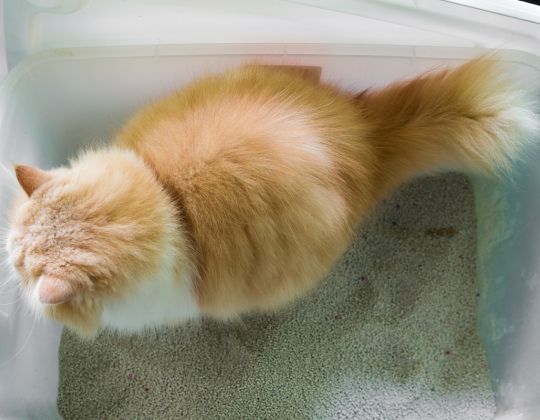What makes a clean, well-trained cat suddenly avoid the litter box? When a cat changes their bathroom habits, it’s usually a sign that something is wrong physically, emotionally or in their environment. One of the most common and concerning issues is a cat pooping outside the box.
A cat pooping outside the box is usually reacting to an underlying issue like stress, illness, or problems with the litter box setup. Common causes include constipation, dirty litter, arthritis, or changes in the home. Identifying the root cause is key to fixing the behavior.
Understanding the reason behind it is the first step toward helping your cat return to normal habits.
Common Causes of Cat Pooping Outside the Box
Most cases of cat poop outside the litter box fall into one of three categories: medical conditions, behavioral triggers, or environmental issues. Often, there’s more than one factor at play.
Medical Causes
Health problems are a frequent reason cats stop using the litter box for stool. If pooping becomes painful, urgent, or physically difficult, a cat may associate the box with that discomfort and start avoiding it.
Constipation and Difficult Stool
When a cat struggles to pass hard, dry stool, it can lead to pain or frustration. After a few difficult experiences, they may choose to poop outside the box to avoid reliving the discomfort.
Diarrhea and Urgency
Loose or watery stools create a sudden need to go that your cat may not be able to control. If they don’t make it to the box in time, they may start avoiding it altogether, especially if the smell of cat poop lingers afterward.
Inflammatory Bowel Conditions
Digestive disorders like IBD can make bowel movements unpredictable and uncomfortable. The pain and frequency associated with these conditions often lead to accidents or box avoidance.
Pain When Pooping
Any issue that causes discomfort during defecation like rectal irritation or past trauma can create a negative association with the box, even if the medical issue has been resolved.
Anal Gland Problems
Swollen or infected anal glands can make pooping painful. After experiencing this pain in the litter box, a cat may avoid it the next time they feel the urge.
Arthritis and Mobility Issues
Senior cats and those with joint pain may find it hard to step into the box or squat. If the box is too high-sided or hard to reach, they may eliminate somewhere more accessible.
Spinal or Nerve Problems
Neurological conditions can affect bowel control. Cats may not realize they need to poop or may not be able to hold it long enough to reach the box.
Parasites and Digestive Irritation
Worms or protozoa like giardia can cause inflammation and stool changes. The resulting discomfort can contribute to box refusal.
Post-Surgery Discomfort
Cats recovering from surgery may temporarily avoid the box due to soreness, grogginess, or reduced mobility. This behavior usually improves with healing.
Behavioral Causes
Even when cats are physically healthy, stress, fear, and emotional changes can affect where they poop. Cats are highly sensitive to their surroundings, and changes in routine or household dynamics often affect their litter box habits.
Stress from Routine Changes
Sudden changes like a new work schedule, rearranged furniture, or different feeding times can unsettle your cat. That anxiety may show up in the form of a cat doing the toilet outside the litter tray or near their usual areas.
New People or Pets in the Home
Cats may feel insecure or displaced after the arrival of a new baby, roommate, or animal. As a coping mechanism, they may start pooping outside the box.
Tension Between Cats
If one cat is bullying another near the litter box, the more timid cat may start pooping elsewhere to avoid confrontation. This kind of social tension is common in homes with many cats.
Fear of the Litter Box Itself
A single negative experience like being startled or feeling pain during defecation can lead a cat to associate the box with danger. Once this link forms, it can be difficult to undo without intervention.
Territorial Responses
Some cats respond to perceived threats by marking their territory with feces. This behavior can be triggered by outdoor cats, construction noise, or household changes that shake their confidence.
Seeking Safer Spaces
If the box feels exposed or uncomfortable, a cat may choose a more hidden or quiet spot to go. Closets, corners, and under furniture are common choices where cat poops if they don’t feel safe.
Environmental Causes
The setup and maintenance of your cat’s litter box play a major role in whether or not they use it consistently. Even minor problems with the litter, box style, or placement can lead to accidents.
Dirty or Neglected Litter Box
Cats won’t use a dirty toilet. If the box is not scooped daily or smells unpleasant, many cats will look for a cleaner location to eliminate.
Scented or Unfamiliar Litter
Strong fragrances or a sudden switch in litter texture can be enough to deter a cat from using the box. Most prefer unscented, fine-grain litter that feels soft underfoot.
Litter Box Placement
If the box is in a noisy or high-traffic area like next to a washing machine or near children, it may feel unsafe. Cats prefer quiet, calm spaces where they can eliminate without disturbance.
Not Enough Litter Boxes
In homes with multiple cats, sharing boxes often leads to conflict. Each cat should have access to their own box, plus one extra box in the home, ideally spaced out in different areas.
Box Is Hard to Access
Boxes that are too small, too tall, or located behind closed doors can be difficult for some cats to use. This is especially true for older cats or those with limited mobility.
Dislike of Covered Boxes
Covered boxes may feel cramped or trap odors. Some cats prefer open boxes that offer visibility and airflow.
Changes Made Too Quickly
Sudden changes to litter type, box design, or box location can confuse or upset your cat. Even upgrades should be introduced gradually to allow time for adjustment.
How to Get Your Cat Back in the Box
Once medical issues are ruled out or treated, focus on improving the litter box environment and reducing stress.
- Keep the box clean by scooping at least once daily and washing it weekly with unscented soap and warm water. Stick to the same litter your cat is used to unless there’s a clear reason to switch, and make any changes slowly.
- Place the litter box in a calm, quiet area that’s easy to access. In multi-cat homes, offer enough boxes in separate locations to prevent competition. For senior or arthritic cats, use a box with low sides for easy entry.
- Thoroughly clean soiled areas with an enzyme-based cleaner to remove any lingering odor. This helps prevent repeat accidents in the same spot.
- Help reduce stress by keeping your cat’s routine predictable. Provide enrichment such as playtime, scratching posts, and safe vertical spaces. In some cases, pheromone diffusers or calming supplements may help ease anxiety.
- Never punish your cat for pooping outside the box. Punishment increases stress and often worsens the problem. Instead, focus on understanding and addressing the underlying cause.
When to Contact Your Vet?
You should schedule a vet visit if:
- Your cat is straining, crying, or passing blood with stool
- They’re lethargic, not eating, or hiding more than usual
- Your cat keeps pooping on the floor despite clean conditions
- They urinate in the box but consistently poop elsewhere
- You’ve recently changed litter, food, or box setup and the issue started afterward
Your vet may perform a physical exam, fecal test, bloodwork, or imaging to rule out or confirm a medical issue. If no health problem is found, a behavior consultation may be recommended.
Wrap-up
Pooping outside the litter box is your cat’s way of telling you something isn’t right. Instead of frustration, respond with patience and care. By understanding the cause and making small, supportive changes, you can help your cat feel secure and get their bathroom habits back on track.
FAQs
Why does my cat keep pooping on the floor only at night?
Your cat may be pooping on the floor at night due to poor litter box access in the dark, nighttime anxiety, or a dislike of the box’s location. Try placing an extra box nearby and adding a soft nightlight to make the area more comfortable and easy to reach.
Why does my cat keep pooping on the floor but still pee in the box?
Your cat may be avoiding the box for pooping due to pain, stress, or discomfort linked to defecation. They still use it to pee because urination feels normal. This behavior often points to a medical issue or a litter box setup your cat finds unsuitable for pooping.
Should I punish my cat for pooping outside the litter box?
No, punishing your cat will not help and can make the problem worse. Cats do not poop outside the litter box out of spite. It is usually a sign of stress, discomfort, or a health issue. Focus on understanding the cause and creating a safe, clean, and calm environment for your cat.



